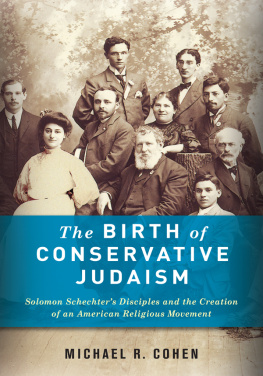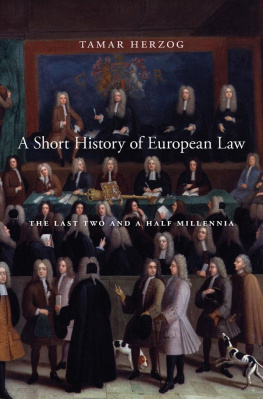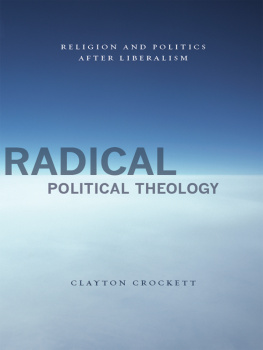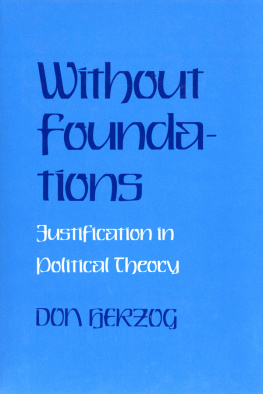INTIMACY & EXCLUSION
Intimacy & Exclusion
Religious Politics in Pre-Revolutionary Baden
Dagmar Herzog
WITH A NEW INTRODUCTION BY THE AUTHOR
Originally published in 1996 by Princeton University Press
Published 2007 by Transaction Publishers
Published 2017 by Routledge
2 Park Square, Milton Park, Abingdon, Oxon OX14 4RN
711 Third Avenue, New York, NY 10017, USA
Routledge is an imprint of the Taylor & Francis Group, an informa business
New material this edition copyright 2007 by Taylor & Francis.
All rights reserved. No part of this book may be reprinted or reproduced or utilised in any form or by any electronic, mechanical, or other means, now known or hereafter invented, including photocopying and recording, or in any information storage or retrieval system, without permission in writing from the publishers.
Notice:
Product or corporate names may be trademarks or registered trademarks, and are used only for identification and explanation without intent to infringe.
Library of Congress Catalog Number: 2007031618
Library of Congress Cataloging-in-Publication Data
Herzog, Dagmar, 1961
Intimacy and exclusion: religious politics in pre-revolutionary Baden / Thir
Dagmar Herzog.
p. cm.
Originally published: Princeton, N.J.: Princeton University Press, c1996
Includes bibliographical references and index.
ISBN 978-1-4128-0702-9 (alk. paper)
1. Baden (Germany)Politics and government. 2. Liberalism
GermanyBadenHistory19th century. 3. JewsEmancipation
GermanyBaden. 4. FeminismGermanyBadenHistory. 5. Baden
(Germany)Ethnic relations. I. Title.
DD801.B18H47 2007
320.9434609034dc22 2007031618
ISBN 13: 978-1-4128-0702-9 (pbk)
IN MEMORIAM
Frederick Herzog
NOVEMBER 29, 1925-OCTOBER 9, 1995
IN THE EARLY 1990s, as I was writing Intimacy and Exclusion, it often appeared as if Jewish history and German history of the nineteenth century were pursued as though they had happened on different planets. This was all the more peculiar in the historiography on nineteenth-century German liberalism, since scholarly interest in that subject was motivated not least by the desire to understand how Germans in the twentieth century could have been drawn into National Socialism, aggressive anti-Jewish attitudes and policies, and participation in the Holocaust. Historians argued over whether and, if so, how German liberalism differed from its counterparts in France and Britain, and sought to periodize and describe the differences in socioeconomic and political developments that explained what they saw as Germany's divergence from the rest of the West. Jewish history scholars, meanwhile, assumed that nineteenth-century German liberals had been Jews' best friends, elaborated on German Jews' struggles for emancipation and equality as well as the pressures to assimilate into mainstream German society and Jews' success in doing so, or charted the onset of anti-Semitic political mobilization in the aftermath of German unification in 1871 and the economic depression of 1873. Few scholars bothered to investigate what early nineteenth-century German liberals had actually said about Jews, or to analyze the interactions of Jews and gentiles in German political and cultural life in the first half of the nineteenth century and to consider to what an extraordinary extent the majority society had been preoccupied with the religious / ethnic minority of Jews in its midst. Meanwhile, non-Jewish historians of twentieth-century Germany often wrote their scholarship as though the Holocaust was a footnote, or a parenthesis, and as though writing about it would best be left to Jewish colleagues.
Few changes in the world of German history and interdisciplinary German studies have been more dramatic than the transformations wrought over the course of the 1990s, as gradually an integration took place between Jewish history and German history of the nineteenth century as well as between Holocaust studies and twentieth-century German studies. A wealth of books and articles on nineteenth-and early twentieth-century Germany have appeared which allow crucial insights into the dual phenomenon characterizing gentile-Jewish relations in Germany during the one hundred years of gradual Jewish emancipation: on the one hand, the remarkable intimacy often existing between gentiles and Jews and, on the other, the exclusionary impulses and blunt aggressions also recurrently expressed by gentiles toward Jews. Likewise, there has been a boom in scholarship on ordinary Germans' entanglement in the genocide of European Jewry a project no longer carried only by Jewish scholars, but also by increasing numbers of non-Jews and growing attention has been paid to the ways the home front in the Third Reich was imbricated in the processes of persecution and expropriation. In addition, scholars began to document the lasting impact of the Holocaust itself, and indeed also of the tiny minority of surviving Jews who returned to and/or remained in Germany after 1945, on the evolution of political and cultural developments both in the democratic capitalist Federal Republic of Germany and in the state socialist German Democratic Republic. The second half of the 1990s and first years of the twenty-first century saw an explosion of interest in both the mutually enriching and the contemptuously cruel aspects of gentile-Jewish relations in the modern era, and in the intricacies of post-Holocaust memories.
When Intimacy and Exclusion was first published in 1996, it would have been difficult as well to predict just how central religious politics would become on a global scale within a few short years. At the time, I strove to explain how important religious conflicts had been in Germany in the first half of the nineteenth century, an era most scholars up to that point had treated as a period of steadily increasing secularization. What I had found was that the first half of the nineteenth century actually saw intense battles over the content and meaning of Christianity in the modern age. I showed that in the 1820s-1840s, German liberalism, in its formative phase, was already a reactive movement, struggling to come to terms with the emergence of a wholly unanticipated development: a modern and politically highly effective form of ultramontanist conservative Catholicism. It was the rise of this religious right that provoked liberals to let go of their previous ambivalence and to become the defenders of Jewish rights most scholars had assumed they were all along. It was also this challenge of a religiously motivated political conservatism that jolted liberals into becoming the defenders of the separation of church and state and of the defense of the private sphere for which they were subsequently so renowned. Far from being overt secularists, however, liberals in the 1820s-1840s saw themselves as advocates for a humanist and inclusive version of Christianity. Indeed, Intimacy and Exclusion also documented the efforts of radical liberals to develop a social justice-oriented strand within Christianity, an early form of what we would now call liberation theology. At the same time, I explored how defensive and disoriented both moderate and radical liberals often were in the face of a religious right which appealed to irrationalism, fomented anti-Semitism, utilized sexual innuendo, and appropriated the liberal ideals of freedom, tolerance, and equality to advance its own unapologetically authoritarian and intolerant agendas.








